Poultry News
Bpex has launched point-of-sale material for butchers as part of its campaign to promote pulled pork.

The kits will contain posters, window vinyls and recipes with the strapline ‘Perfect for Pulled Pork.’
Bpex hopes the campaign will help boost sales of pork shoulder, after the levy board found very few young people were eating fresh pork at home, remaining popular with over-60s age group.
The promotional activity will be supported by a £2m television marketing campaign.
Butchery and product development manager at Bpex, Keith Fisher, said: “We are hugely excited by this campaign and its potential impact on pork shoulder sales and wanted to give the independent retail sector every opportunity to benefit. We know that promotional kits are well received, not just by butchers, but also their customers, who can take much-needed recipe inspiration away with them. In fact, anecdotal evidence suggests that effective merchandising can increase sales by as much as up to 25%.”
The meat snacking market provides a substantial opportunity for businesses, according to a new report into eating habits.
The report, Redefining Healthy Snacking, found the meat snacking market has increased over 20% in several countries between 2012-2014.
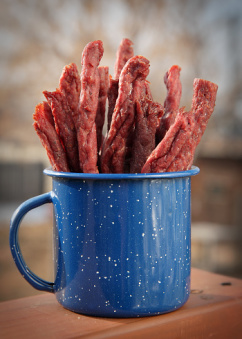
According to market analysts Neilsen, between 40% and 60% of consumers in different regions of the globe often replace a meal with a snack. The Redefining Health Snacking report found several companies are exploiting this to their advantage.
“The businesses that are proving rather successful are the ones that are creating new markets with new, differentiated snack concepts, often using new ingredients and processes, often sold under new brands (or old brands that have been boldly reinvented) with new messages,” said Julian Mellentin, author of the report. “They do not follow the market with predictable products.”
Meanwhile the report states that start-up companies are best placed to capitalise on the trend: “consumers’ beliefs about what healthy means have fragmented massively, creating a wealth of niches that can be used as platforms to build successful brands. Big companies tend to overlook areas that seem too small, leaving the way clear for entrepreneurs and start-ups.”
Food deflation continues to have an impact on meat and poultry sales according to the latest data from Kantar Worldpanel.
For the 12 weeks ending 19 March 2015, average volume sales were down, with turkey and pork experiencing the biggest decline, at -5.2% and -4.8% year-on-year respectively.
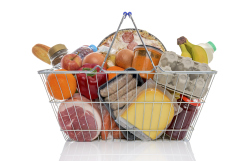
Kantar said basket size and frequency of purchase remained flat as food deflation was making the same basket cheaper.
“Fresh primary meat and poultry continues to be impacted by deflationary pressures, with the average price per kg down significantly. While this helps to drive more shoppers into the category, we are seeing basket sizes and frequency flat, as deflation makes the same basket cheaper,” Kantar Worldpanel reported.
The Office for National Statistics reported in February that food inflation had reached an all-time low at 0%, whcih remained unchanged in March.
Meanwhile a survey carried out by mySupermarket.com found that the average weekly grocery shop had fallen from £88.59, for a basket of 35 items to £87.70. The survey also found that the average weekly shop of grocery products from the main UK supermarkets had fallen 7% in the last year, with the same basket costing £93.95 in March 2014.
Meanwhile, lamb has benefited from increased Easter sales – up 14.3% on the same period last year. Kantar said price cuts and strong promotions were driving strong uplifts in sales before Easter.
Chicken processor Moy Park has been presented an International Safety Award with merit for promoting high standards of health and safety management in the workplace.
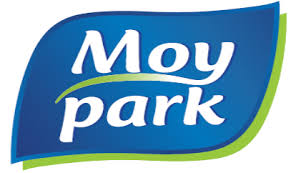
This is the second year Northern Ireland’s Moy Park has picked up the accolade, which was this year delivered to its Convenience Business Unit
Mike Mullan, Moy Park’s HR Director of Europe, commented: “We are delighted to have received this great accolade once again. It is fantastic for Moy Park to sit among leading businesses from across the UK and the rest of the world. At Moy Park we are committed to continually driving forward health and safety practices for our employees and to maintaining the very highest standards. We are honoured that these high standards have been acknowledged with this prestigious award.”
The awards, run by the British Safety Council, are in their 57th year.
Neal Stone, acting chief executive of the British Safety Council, congratulated Moy Park on its success. Stone said: “Awards have an important role to play in shining a light on those employers who are taking sensible and effective steps to ensure the health, safety and welfare of their workers, celebrating their efforts and encouraging other businesses everywhere.
“The International Safety Awards rightly reflect the importance of aiming for good standards of health and safety at work. Moy Park’s Convenience Business Unit should rightly be proud of its achievement.”
Moy Park has developed a state-of-the art poultry development house, which it said will allow it to deliver “significant improvements” to its poultry rearing and welfare practices.
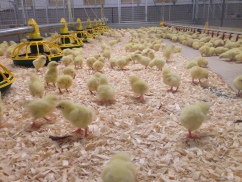
Located in Co Down, the 18,500sq ft house, split into 36 individual pens each holding 500 birds, allows inputs such as feed to be altered, enabling Moy Park to capture and analyse data.
Justin Coleman, Moy Park agriculture development manager, commented: “This poultry development house has been purpose-built to the highest specification, including windows providing natural light, enhanced biosecurity and biomass heating. Chicken is at the very heart of our business and this initiative supports our commitment to sustainability, environmental excellence and developing the farm of the future.
“This investment allows us to lead the way in innovation, providing a precision-controlled environment to better monitor bird welfare, feed conversion and environmental impacts, so we can provide optimum conditions for our chickens.”
The new building is part of a broiler expansion and development programme that is being rolled out across Great Britain and Northern Ireland.
The programme aims to deliver 250 new houses.
Dunbia has reported it will invest £27 million in new headquarters, creating 209 new jobs over the next three years.

The investment will be used for an “intelligent” boning hall at the company’s headquarters in Dungannon, Northern Ireland.
The new boning hall will upgrade the company’s beef mince and diced burger lines to increase overall productivity levels, said the firm.
It will also be used to upgrade technology so that it is more advanced, which Dunbia said would help maximise the return on its resources and help it remain cost-competitive.
“The new boning hall will help the company achieve economies of scale, while the installation of new production lines, using the most modern automated retail butchery, will increase retail packing efficiencies,” Dunbia said in its announcement.
Dunbia Northern Irish processing operations already employ almost 1,000 people in the procurement, slaughter and de-boning of cattle and sheep, wholesale distribution and retail packing of beef and lamb.
Jim Dobson, managing director of Dunbia Group, said: “Innovation has been at the heart of our success and this investment in new production technology will create a centre of excellence for beef deboning in Ireland.
“It will help us to maintain our position as a leading meat processor in the UK and Ireland and to deliver on our growth strategy over the next three to five years.”
UK beef prices are coming under pressure from a range of factors, experts in Scotland have claimed.
According to Quality Meat Scotland (QMS), a number of issues, including currency exchange rates, were impacting on the beef sector, with the strong sterling increasing the gap between Irish and European prices.
Stuart Ashworth, head of economic services with QMS, said: “Despite Irish producers getting 6% more euros from the market than last year, the UK price is 13.5% higher in euros, so the gap has widened. However, because of currency movements, while the UK price is around 2-3% lower in sterling, Irish prices have fallen by 7-8%.”
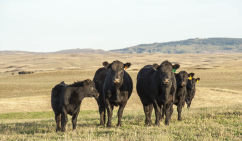
Latest statistics from January show UK beef exports declining, while imports, including Irish meat, increased, boosting beef volumes on the UK market.
“While some of this would have been used to refill the supply chain after good Christmas trade, once the supply chain was fully restocked, pressure was exerted on prices from a well-supplied market,” Ashworth said.
While prices started the year looking positive, prime cattle values have fallen in the past six weeks, with the average price around 2-3% lower than a year ago, and the number of cattle being slaughtered tightening.
He added: “During February, Scottish abattoirs handled 3.8% fewer prime cattle than last year, compared with Northern Ireland at 2.5% fewer and England and Wales at 2% more.
“However, a bigger influence here is that carcase weights continue to be higher than last year, by around 1.5%. The result is that, despite the number of animals beginning to tighten, the volume of beef they produce is continuing to run ahead of last year.”
Another problem for the sector has been the slowdown in demand for manufacturing beef, which has impacted on the value of forequarter meat in the wholesale markets.
Halal specialist KFQ Meats has extended its ‘Exotique’ offering with a new range of spiced quarter-pounder burgers.
The new products, to be launched tomorrow (21 March 2015), on the KFQ website, include, Thai, Moroccan, South African, Portuguese Piri Piri and Mexican flavours.
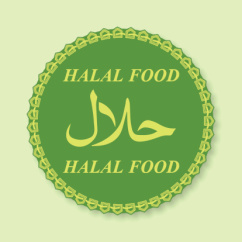
“The Exotique range is aimed squarely at customers who are looking for convenience foods at the luxury end of the market,” explained KQF managing director Faruk Vali.
“The burgers are considerably larger than usual and they contain 90% lean beef. We’ve developed them for consumers who want something really satisfying for special family occasions, and for professional caterers who want to differentiate themselves on the basis of size, quality and flavour,” Vali said.
The Exotique range was originally designed for the export market and has proved popular in France and other European countries. “European consumers have a preference for milder flavours, so although the Exotique burgers and kebabs are based on authentic Indian recipes, they deliver less chilli heat,” KFQ explained.
The move also integrates with the launch of KQF’s Jumbo range of quarter-pounders. This combines KQF’s existing Texan burgers with a new ‘Great British’ range.
Weighing 110g each, the burgers are available in beef, chicken and lamb.
The Exotique products round out the KFQ burger range, as Vali explained: “With the launch of the Exotique and Jumbo ranges, we can now offer burger-lovers an end-to-end selection, starting with the standard 55g family size Classic. Above that, we have the 80g Chunky burger, the 110g Jumbo and the 220g Exotique at the top end.”
Moy Park is looking to capitalise on consumers’ preference for local produce as it looks to grow its fresh poultry sales in the UK and Ireland.
Detailing its strategy for 2015 at a special event held by parent company Marfrig Global Foods this week, Moy Park’s chief executive Janet McCollum told delegates that poultry is predicted to grow faster than other proteins, at around +3-4%, due to its price point against other meats and its standing as a versatile and healthy protein.
UK consumers’ preference for local produce represents an opportunity to grow domestic sales as around 40% of poultry is imported to the UK, she said, adding that Moy Park was aiming “to continue to grow its fresh poultry business in the UK and Ireland, ahead of the market”.
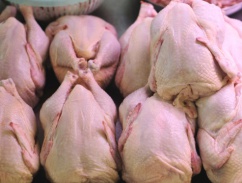
McCollum said the business had increased its processing capacity, and was on target to achieve slaughter numbers of five million birds per week this quarter.
Approximately 78% of Moy Park’s revenue comes from the UK and Ireland, which it supplies with fresh, ready to eat and coated products, mainly into retail, while 22% comes from continental Europe, which is dominated by sales of convenience products in the foodservice sector.
“Therefore it is clear to see that cross-selling opportunities exist to drive further growth,” said McCollum.
The business is also aiming to drive sales growth in Asia and Africa, with an overall target for net sales set at +8.5-10% by 2018.
Other goals include “expanding its multi-protein convenience retail sales, boosting its presence in the foodservice sector and strengthening Marfrig Global’s distribution platform in Europe”.
Subject to market conditions, Marfrig Global Foods also has signalled its intention to launch an Initial Public Offering (IPO) for Moy Park later this year, she confirmed.
The Marfrig Day event on Monday (10 March) followed the publishing of its fourth quarter and full-year results for 2014 last week.
Moy Park increased net revenue by 13% during the fourth quarter of 2014, compared to the Q3, to R$1.5bn (£316m), with revenues for the year up 17% to R$5.5bn (£1.1bn). The increase was positively impacted by currency exchange rates, and strong sales volume increases of fresh poultry and convenience coated products across the retail and foodservice channels in the UK and Ireland.
“This strong performance has been very much underpinned by our continued focus on service, quality and close collaboration with our customers,” said McCollum.
However challenges during 2014 were seen in the form of lower sales prices for poultry products and offals exports due to export restrictions in both Russia and South Africa, as well as lower foodservice volumes in its European business.